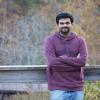news
ISyE Ph.D. Student Paritosh Ramanan Selected as a 2018 Sam Nunn Security Fellow
Primary tabs
Everyone has experienced a power outage, often because of thunderstorms or tornadoes. Outages could also occur because of terrorist attacks or hackers into the electric power grid.
In order to minimize the impact of such events, Paritosh Ramanan, a Georgia Tech student working on his Ph.D. in computational science and engineering – an interdisciplinary degree housed in the Stewart School of Industrial and Systems Engineering (ISyE) – is conducting research to optimize power system requirements.
“Let’s say there’s a power grid over the state of Georgia,” Ramanan said. “There are generators at certain points – one might be in Atlanta, one might be Macon, one might be somewhere else. And you’re transferring generated power to consumers all over the state.
“So there are questions that you need to answer with respect to getting the most efficient output from the power system.”
In order to accomplish this task, an industrial engineer needs to come up with an algorithm that takes into account the demand for electricity and how many generators are available and then determines when generators should be operational, based on these constraints.
“This is a very complex problem,” Ramanan noted. “I’m trying to find out if these different power companies can come together and – while keeping their data operations private – try to solve this problem together to achieve computational efficiency.”
In addition to his dissertation research, Ramanan is interested in how governments work. As such, he applied for and was selected to be a 2018 Fellow in the Sam Nunn Security Program housed in Tech’s Ivan Allen College. The program is funded by the MacArthur Foundation’s Science, Technology, and Security Initiative, and aims to educate young and mid-career scientists and engineers about national security issues and provide the analytical tools they need to interact with the policy community.
The objective of the fellowship is specifically to apply research being conducted at Tech to policy-making on the state and federal government levels.
“They’re particularly interested in research – whether in health, aerospace, or energy – that can make the nation’s security apparatus more robust,” said Ramanan. “They’re interested in problems that have a security aspect as well. My research is at the very heart of what they’re looking for.”
Ramanan’s research aims to develop an asynchronous decentralized power network. Each power company or subsidiary can retain control of its own infrastructural data but yet also contribute to solving a global problem. In this way, a decentralized approach can very much thrive while simultaneously making the operations extremely robust. Since an asynchronous method does not impede progress of individual players, cyberattacks on multiple participants do not crumble the entire global operation scheme.
If a network is asynchronous and decentralized, “an attack is much harder to orchestrate to bring down the whole network,” Ramanan explained.
For example, in a conventional decentralized method, all the players cooperate to solve a global problem. However, if even one of them is brought down due to a denial of service attack or an outage caused by human error – such as the massive 2017 Amazon AWS outage, everyone gets stalled, and the progress toward solving the global problem comes to a standstill.
In such a scenario, an asynchronous decentralized method can help. Unlike the synchronous counterpart described above, players can use the latest available information from their peers to keep progressing toward solving the remaining global problem. An asynchronous method can guarantee resiliency throughout the system.
Ramanan is looking forward to sharing his work with policymakers. In spring 2019, he will travel with the other Sam Nunn Security Fellows to Washington, D.C., where they will have the opportunity to meet with officials from federal agencies – such as the Department of Energy and the Department of the Interior, as well as with lawmakers.
“Since my research is at this intersection, and since the objective of the fellowship was something very closely related to what I was doing,” Ramanan added, “I thought it would be an amazing opportunity for me to try and find out how this can be used for policymaking at the federal level, as well as at the state level. It has universal applications.”
Status
- Workflow status: Published
- Created by: Shelley Wunder-Smith
- Created: 06/28/2018
- Modified By: Shelley Wunder-Smith
- Modified: 06/28/2018
Categories
User Data

